 Petzlover
Petzlover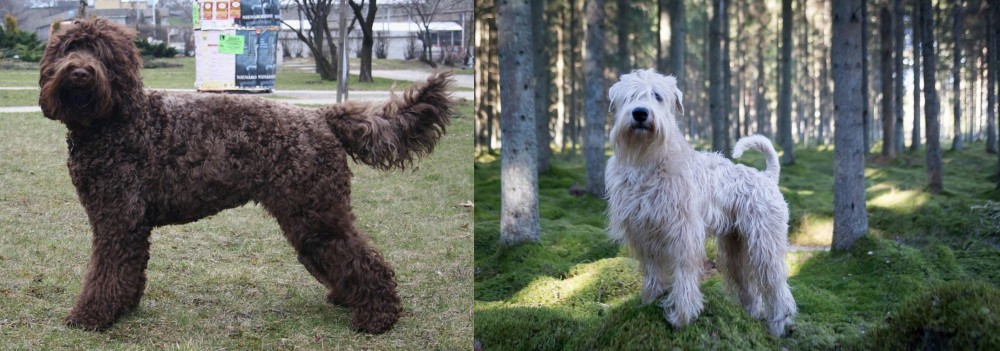 Barbet is originated from France but Soft-Coated Wheaten Terrier is originated from United Kingdom. Barbet may grow 16 cm / 7 inches higher than Soft-Coated Wheaten Terrier. Barbet may weigh 8 kg / 18 pounds more than Soft-Coated Wheaten Terrier. Both Barbet and Soft-Coated Wheaten Terrier has same life span. Both Barbet and Soft-Coated Wheaten Terrier has almost same litter size. Both Barbet and Soft-Coated Wheaten Terrier requires Moderate Maintenance.
Barbet is originated from France but Soft-Coated Wheaten Terrier is originated from United Kingdom. Barbet may grow 16 cm / 7 inches higher than Soft-Coated Wheaten Terrier. Barbet may weigh 8 kg / 18 pounds more than Soft-Coated Wheaten Terrier. Both Barbet and Soft-Coated Wheaten Terrier has same life span. Both Barbet and Soft-Coated Wheaten Terrier has almost same litter size. Both Barbet and Soft-Coated Wheaten Terrier requires Moderate Maintenance.
 The Barbet is an ancient European waterdog, with the first references to it coming way back from 1387. This breed is thought to serve as a common ancestor for several other waterdogs, and these include the poodle. The breed was used to retrieve water fowl from water, and today it is used as a gundog and as a companion.
The Barbet is an ancient European waterdog, with the first references to it coming way back from 1387. This breed is thought to serve as a common ancestor for several other waterdogs, and these include the poodle. The breed was used to retrieve water fowl from water, and today it is used as a gundog and as a companion.
The name ‘Barbet’ comes from the French word for beard, which is ‘barbe’. The Kennel Club has announced that this dog is to be described as being in a class of its own, and it has become the 220th pedigree breed.
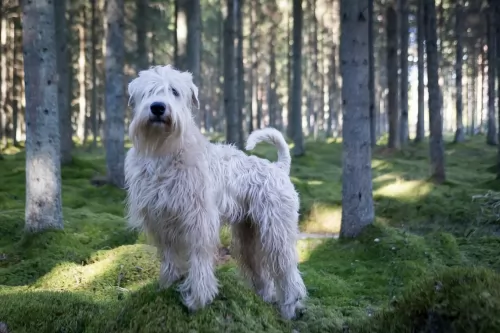 This wheaten colored terrier hails from Ireland. Although the Wheaten has been around for a long time, it was in 1937 that he was recognized as a breed in Ireland.
This wheaten colored terrier hails from Ireland. Although the Wheaten has been around for a long time, it was in 1937 that he was recognized as a breed in Ireland.
The British Kennel Club also recognized the Wheaten and the dog was also exported to the United States. Serious interest started being shown for the Terrier in the 1970s. It was in 1973 that they were recognised by the American Kennel Club.
 The Barbet is a medium-sized breed of French water dog, measuring anything between 52–66cm in height. The dog is known for his thick, curly textured coat and even the head and tail are covered with this dense hair. His coat is waterproof.
The Barbet is a medium-sized breed of French water dog, measuring anything between 52–66cm in height. The dog is known for his thick, curly textured coat and even the head and tail are covered with this dense hair. His coat is waterproof.
The coat can vary in color and these colors can be brown, grey, white, fawn or black. The dog isn’t a heavy shedder. The Barbet’s tail is long and somewhat raised but not erect. He has long, wide pendant ears set at eye height, the skull is broad and the neck short and strong.
With his kind brown eyes, it simply adds to the kindly expression of this attractive gun dog. He is a friendly, fun-loving dog, and makes a great family pet. He loves to swim and in fact has webbed paws to assist him with his swimming. Some dog owners say that this intelligent active breed can be a great watchdog, while others say the being a guard dog isn’t a particularly strong characteristic.
 The Wheaten is a medium sized dog standing at between 43 and 50cm and weighing between 13 and 20kg both male and female. The coat of the dog is soft, silky and wavy to even curly and is a wheaten to ginger color.
The Wheaten is a medium sized dog standing at between 43 and 50cm and weighing between 13 and 20kg both male and female. The coat of the dog is soft, silky and wavy to even curly and is a wheaten to ginger color.
The coat of the puppy is dark but as he grows up it changes into the wheaten color although the ears may be a dark brown color. Pet owners like that the Wheaten is a very low shedding dog.
Playful, social and friendly, the Wheaten has always been put to good use on the farm. These days he is pet and companion. He is energetic and playful so children love having him around.
He is slightly more hyper and energetic than other Terrier breeds so will require a good dose of exercise.
He is smart and strong willed, and training and socialization turns him into an amicable pet to have around, so much so that he is sought after as a therapy-dog.
They’re easy-going dogs with no aggression issues but they still make great watch dogs and want to do whatever it takes to look after- and protect their human family.
 Most Barbets do superbly well with children and are naturally gentle with them. It is always important to teach children to respect animals and to be kind towards them. Even a gentle dog like the Barbet can turn aggressive if taunted beyond their endurance.
Most Barbets do superbly well with children and are naturally gentle with them. It is always important to teach children to respect animals and to be kind towards them. Even a gentle dog like the Barbet can turn aggressive if taunted beyond their endurance.
Barbets are social, good mixers and they get on well with other pets in the family, more so when they have been properly socialized. As a Sporting breed, the Barbet is energetic and loves to be involved in games and activities. He is such a versatile dog – gentle and friendly and he makes a wonderful devoted pet. Of course, he is also suited for use as a working dog, after all this breed was originally used for hunting waterfowl.
Treat him well and the thanks you’ll get will is unconditional friendship and loyalty.
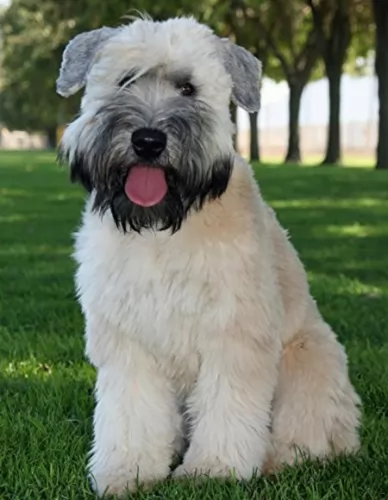 The Soft Coated Wheaten Terrier has always made an excellent farm dog, but today he is more suited as pet and companion.
The Soft Coated Wheaten Terrier has always made an excellent farm dog, but today he is more suited as pet and companion.
He adapts easily to life in the city or the countryside. Wherever he is, he will need his exercise. He also longs to be an active part of his human family, and then he’s happy, lively, social and friendly and is a great playmate for children.
 The Barbet is a rare breed and therefore not much is known about particular health issues affecting him. Some health issues that you will need to be alert about with your Barbet are ear infections, hernias and hip dysplasia.
The Barbet is a rare breed and therefore not much is known about particular health issues affecting him. Some health issues that you will need to be alert about with your Barbet are ear infections, hernias and hip dysplasia.
A veterinarian should be consulted if your dog shows signs of these ailments. The risk of a Barbet developing any health condition can always be significantly reduced by making sure you buy your Barbet from a reputable breeder. If he is fed well and taken to the vet when he does get sick, he can live to be 13 to 15 years of age.
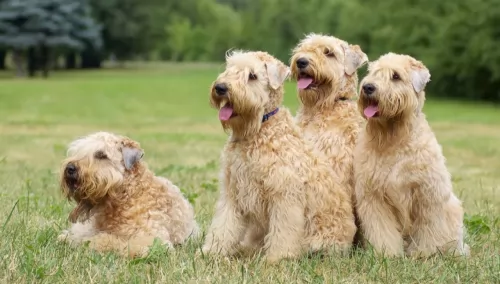 When you bring a Wheaten Terrier into your home, you’re not likely to have too many vet fees as he tends to be a healthy dog breed, being able to reach 13, 14 or 15 years of age with good care.
When you bring a Wheaten Terrier into your home, you’re not likely to have too many vet fees as he tends to be a healthy dog breed, being able to reach 13, 14 or 15 years of age with good care.
Look out for a dog ailment known as Protein-losing enteropathy (PLE). This is a condition where the dog isn’t able to properly absorb protein in the digestive tract, so that it is passed in their stools.
It can be fatal, but if caught early, some dietary changes can keep it under control.
Also, look out for inflammatory bowel disease. This disease occurs when the stomach of the dog has a large number of inflammatory cells which can change the lining of the digestive tract, preventing the normal absorption of food.
 The Barbet’s coat is longish and curly, much like a poodle, and long, wooly coat This being the case, moderate maintenance is required. Brushing and grooming twice a week will be necessary to keep the coat from matting too much. In fact, some Barbet owners prefer to keep their Barbets professionally groomed so that the thick hair is fairly short all over.
The Barbet’s coat is longish and curly, much like a poodle, and long, wooly coat This being the case, moderate maintenance is required. Brushing and grooming twice a week will be necessary to keep the coat from matting too much. In fact, some Barbet owners prefer to keep their Barbets professionally groomed so that the thick hair is fairly short all over.
The dog’s ears will also need to be kept clean and dry.
If your Barbet is a farm dog, used for hunting or working purposes, make sure to buy dog food formulated for active dogs. Your Barbet puppy up to the age of 3 months will require 4 meals a day. When your Barbet reaches a year of age he can be fed one or two bowls of food. Speak to your veterinarian about top-quality wet- and dry foods. Every dog will require raw meat added into their food once in a while.
Make sure there is a constant supply of cool, fresh water and also wash his food and water bowls regularly.
The Barbet is an intelligent breed and therefore trainable. Dog owners who care for their pets, see to it that they are trained and have been socialized. This makes dogs much nicer to live with as they get on well with children and other pets and they don’t bark incessantly.
The Barbet is a working breed so you can’t just leave him in your back garden day after day. To stay healthy and happy, he will need to be played with, taken for walks and exercised regularly.
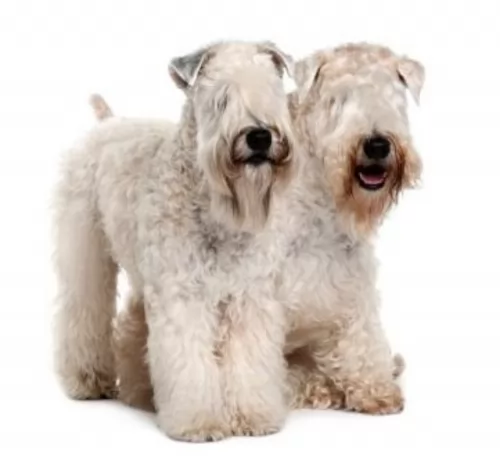 Brush your pet’s silky coat twice a week. Such a silky coat can get all tangled and matted. If you prefer, many people opt to rather have the Wheaten’s coat professionally clipped as then it is easier to handle. They like to have the hair clipped that hangs over the dog’s eyes.
Brush your pet’s silky coat twice a week. Such a silky coat can get all tangled and matted. If you prefer, many people opt to rather have the Wheaten’s coat professionally clipped as then it is easier to handle. They like to have the hair clipped that hangs over the dog’s eyes.
Other grooming tasks require you to check inside his ears for redness which could indicate an infection. Trim his nails and check him over for ticks and fleas.
Have your Wheatie trained and socialized as he is a stubborn dog breed and you want him to be well mannered and obedient.
Terriers like this are energetic dogs and he is going to need exercise every day. A walk for a dog is always a welcome experience as it gives him the opportunity to sniff around and pick up new smells. Play ball- or frisbee games with him as this can tire him out a bit.
If your dog shows signs of illness, get him to the vet. He is such a feisty dog that it can be unbearable to see him out of sorts.
Terriers are energetic dogs so if you feed your dog one of the commercial dog foods, make sure the label indicates what food it is. This is because the foods are manufactured according to the type of dog it is, its age, size and energy levels.
Always try and go for the high quality foods which don’t have all those unhealthy ingredients in them. Try to include some home-made food – nothing exotic and spicy – just plain, wholesome food that won’t upset his stomach.
Boiled chicken, brown rice or pasta and spinach, sweet potatoes and carrots is super tasty and nutritious. You can chop it up and add it to your pet’s kibble twice a week.
Try and include a little bit of raw meat to his diet occasionally as this can go towards ensuring he doesn’t get skin diseases. Always ensure he has a constant supply of fresh, cool water available.